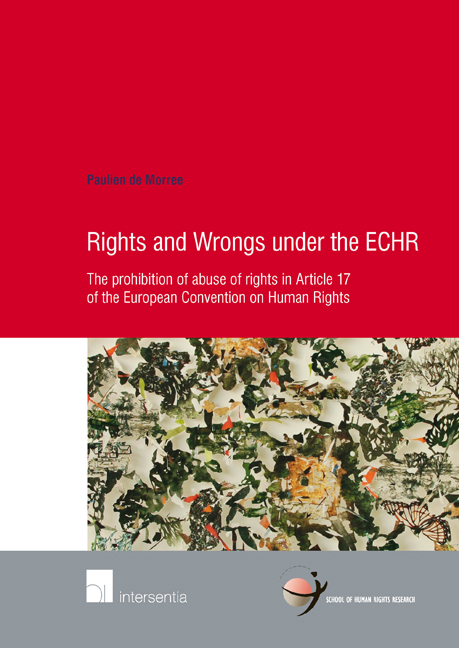 Rights and Wrongs under the ECHR
Rights and Wrongs under the ECHR Book contents
- Frontmatter
- Acknowledgements
- Contents
- List of Abbreviations
- Chapter 1 Introduction
- Chapter 2 The Creation of the European Convention on Human Rights
- Chapter 3 The Strasbourg Case Law on Article 17 ECHR
- Chapter 4 The Interpretation of Article 17 Echr in Legal Doctrine
- Chapter 5 Other Abuse Clauses in Human Rights Law
- Chapter 6 The Concept of Abuse of Rights
- Chapter 7 The Concept of Militant Democracy
- Chapter 8 The German ‘Wehrhafte Demokratie’
- Chapter 9 Militant Democracy in the Context of the ECHR
- Chapter 10 Conclusions
- Bibliography
- Table of Cases
- Samenvatting
- Curriculum Vitae
- School of Human Rights Research Series
Chapter 9 - Militant Democracy in the Context of the ECHR
Published online by Cambridge University Press: 12 December 2017
- Frontmatter
- Acknowledgements
- Contents
- List of Abbreviations
- Chapter 1 Introduction
- Chapter 2 The Creation of the European Convention on Human Rights
- Chapter 3 The Strasbourg Case Law on Article 17 ECHR
- Chapter 4 The Interpretation of Article 17 Echr in Legal Doctrine
- Chapter 5 Other Abuse Clauses in Human Rights Law
- Chapter 6 The Concept of Abuse of Rights
- Chapter 7 The Concept of Militant Democracy
- Chapter 8 The German ‘Wehrhafte Demokratie’
- Chapter 9 Militant Democracy in the Context of the ECHR
- Chapter 10 Conclusions
- Bibliography
- Table of Cases
- Samenvatting
- Curriculum Vitae
- School of Human Rights Research Series
Summary
Introduction
This is the last chapter in a series of three on the concept of militant democracy. This chapter will explore to what extent the understanding of the concept of militant democracy as a fundamental feature of the ECHR can help us to interpret the abuse clause in Article 17 ECHR. In the previous two chapters we have seen that militant democracy is a diffuse concept. Chapter seven has shown that there is no uniform theory on militant democracy. This has resulted in a wide range of approaches to and interpretations of the concept of militant democracy, both in theory and in practice. At the same time, several legal scholars have pointed out that militant measures taken in the name of protecting democracy, such as party bans and restrictions on political speech, are prima facie undemocratic in the sense that they restrict the political participation of anti-democratic enemies. So, whereas an open democracy may be structurally weak, an excessively militant democracy may eventually no longer be democratic, some of them have warned. The assumptions and practices of militant democracy should therefore be continuously scrutinised.
Chapter eight has provided an illustration of the interpretation of the concept of militant democracy in the concrete context of Germany. The German legal order represents the most explicit and far-reaching implementation of the concept of militant democracy. The German wehrhafte Demokratie finds its sharpest expression in the abuse clause in Article 18 Basic Law, which provides for a special judicial procedure in which the Federal Constitutional Court (Bundesverfassungsgericht) can decide to forfeit certain constitutional rights of individuals and groups that use these rights ‘to combat the free democratic basic order’. Yet, as we have seen, the German ‘free democratic basic order’ is first and foremost defended by other militant instruments that are considered less far-reaching, such as the prohibition of associations and restrictions on free speech. Within the militant scheme of the German legal order the abuse clause in Article 18 BL therefore appears to be ‘a prominent political warning more than anything else’.
Finally, as questions of self-defence are vital to every democratic system, these issues have also proven to be relevant to the ECHR. In Chapter two we have seen that the Convention came into being at a critical moment in European history.
- Type
- Chapter
- Information
- Rights and Wrongs under the ECHRThe prohibition of abuse of rights in Article 17 of the European Convention on Human Rights, pp. 225 - 246Publisher: IntersentiaPrint publication year: 2016
